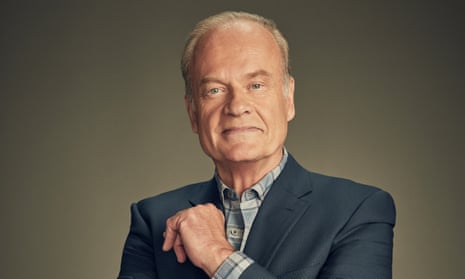The person Kelsey Grammer most wanted to like the Frasier reboot will never see it. “He was my father,” said Grammer when John Mahoney died in 2018. “I loved him.” Grammer’s own father was killed when he was 13, a year after the death of the grandfather who raised him. When Mahoney took the role of Frasier’s dad Martin, he also adopted the role of a loving, stable parent for what was a notably close cast. Taking Grammer to rehab in 1996 was, said Mahoney, “the hardest thing I’ve ever done in my life”. But it worked.
Almost all the main players from the original show passed on the chance to return. Yet Grammer was adamant that Mahoney would somehow be present.
“Absolutely,” he says, beaming down a video call: tan skin, blinding smile. The wall behind him is a big grid of family snaps, strewn with dinosaur bunting from his son’s seventh birthday party. Grammer and fourth wife, Kayte, also have a nine and an 11-year-old; Grammer has four further children from previous relationships. The background noise is a persistent happy clatter.
“John was always part of it,” says Grammer. “He was very loved, and it couldn’t go forward without his blessing.” His voice cracks; Grammer is a man with easy access to his emotions. “So we needed to invite him in. And I did.”
The new series begins just after Martin’s funeral. Frasier returns to Boston to see Freddy, his son, who has snubbed academia to emulate his grandad and become a firefighter. But there’s more. There’s a baby named John. A bar called Mahoney’s (est 1940, his birth year). A brief clip of the man himself closes the first show.
Grammer wanted to go further. “I was trying to style the last sequence so we could maybe have a remnant, a physical manifestation of John. We fell short.” Instead, Frasier gives Freddy a flag flown at Martin’s funeral. “I think we hit the sweet spot in terms of honouring John and Martin.”
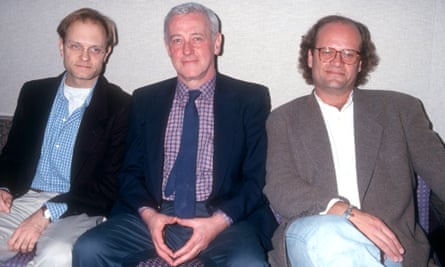
In fact, Mahoney did approve, after a fashion. “I once produced a supernatural show called Medium,” says Grammer. “And I got a call from somebody in that world and they said: ‘I just wanted to tell you: John Mahoney is really happy about this.’” He chokes up. “That was really sweet.”
The original Frasier was a high-stakes spin-off. How do you top a sitcom as adored and acclaimed as Cheers? By making one even better. It brilliantly mixed workplace comedy – pompous radio psychiatrist Frasier juggling calls alongside unabashed producer Roz (Peri Gilpin) – with domestic farce, as Frasier and his yet snootier brother Niles (David Hyde Pierce) butted heads with their salty ex-cop father and, in the case of the latter, lusted after Martin’s daffy physical therapist, Daphne (Jane Leeves). Frasier’s 11 years on air earned 37 Emmys and 108 nominations. The finale was watched live by 34 million people in the US; it remains a staple of TV schedules around the world.
So for Joe Cristalli, the past couple of months have been tense. Cristalli, 38, is a Frasier super-fan who, in 2014, started a Twitter account of contemporary Frasier gags. When Grammer made noises about doing a new show, Cristalli sent him the thread and then – teaming up with Chris Harris, a more experienced TV writer – a pitch. Of the 30 Grammer read, he liked theirs best. Ten episodes were shot this spring, at a gallop as the writers’ strike loomed. Broadcast began in October.
“It’s pretty panic-inducing,” says Cristalli, “to possibly kill the thing you love most. I cared what the critics said, but it was people like me I was really nervous about. The Frasier fan forums can be rabid.”
Happily, reaction has been broadly positive. The consensus seems to be that once you relax into the show – and there’s the palpable sense that cast are doing the same – there’s lots to enjoy. On Reddit, the chief consternation is that Frasier wears jeans. At 68, the character is now filthy rich (he’s been fronting a TV talkshow) and a little hipper.
“Looking back on our [old] show, as silly as it was at times, we sometimes took ourselves too seriously,” says Grammer. “Just a bit like: ‘We’re the greatest show that’s ever been, blah, blah, blah.’ I thought: maybe that’s not such a great tone. So I invited new writers I thought would reflect more silliness. The character is a little less of a prig.”
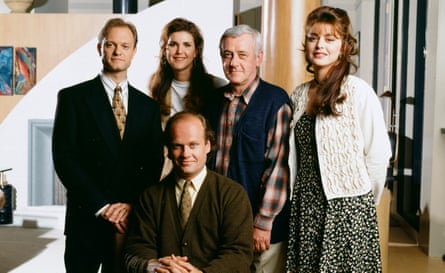
He’s also surrounded by a younger generation. Now a lecturer at Harvard, one of his students is 18-year-old David (Anders Keith), bumbling son of Niles and Daphne. At home is Freddy (Jack Cutmore-Scott) and, next door, actor/bartender Eve (Jess Salgueiro). Both are cute, perky, mid-30s and therefore – in the Frasier canon at least – seriously immature.
As a New Yorker article informed horrified millennials in 2020, when Frasier began in 1993, its hero was just 38. Yep, that sherry-drinking, Steinway-tinkling divorced dad was not even 40. Does Grammer think people today grow up slower? He nods. “I have identified a crux event as when we passed the new healthcare laws. Suddenly it was OK to stay home until you were 26. Stay on your folks’ coverage! It’s insinuated its way into our culture – 26 is a new 18.”
He gives a winning grin. Grammer does this a lot: pivot into an unfashionable opinion with charm and persuasion. So has this infantilisation degraded comedy? “Possibly. The child finds certain, very specific things funny and the sophisticated mind finds other things funny.” Frasier still leans to the latter. “That may distance some of our younger viewers. But I’ve had five-year-olds say: ‘It’s my favourite show!’ and 30-year-olds who say: ‘I’ve never seen it’ – so who knows what’s going on at home.”
Grammer has clear ideas on what’s changed in comedy and how that dovetails with societal decline. It was these, not nostalgia, that fuelled the reboot – “a longing for something funny we can all enjoy that doesn’t have to be filled with a self-deflating representation of who we are. What’s greatly charming about comedy is when it takes itself lightly and generates an affable, affectionate look at where we fall short.
“We can celebrate the human condition together: aren’t we funny? Move on with a bit of joy and not just constant repression and self-cannibalism. There’s almost nothing that can be funny any more. It makes us pretty dreary, doesn’t it?”
Frasier, he explains, is “a great life lesson. He wants to be honest and open and filled with love. So it became a personal mission to give Frasier a third act. He’s still struggling, striving and trying to be a good man.”
It’s true. Even as he nears 70, the character seems to have retained not just his integrity but his optimism, despite a vast arsenal of erudition, sarcasm and bad life choices. Take note, says Grammer: “A lack of sincerity may be a very serious thing. We certainly pose as earnest arbiters of social justice, but it seems like a shell game. Let’s face it, we need to take out a few of the improvements. We are worried about micro-aggressions but quite happy to be openly aggressive to people we don’t agree with. We throw around really hateful words as if they’re just another bon mot.”

This isn’t reactionary hot air. In 1975, Grammer’s 18-year-old sister, Karen, was kidnapped, raped and murdered. He’s just finished writing a book about her, and in doing so “noticed that since that time, the hatred that killed her hasn’t really gone anywhere. In fact, it’s kind of gained ground.”
That’s down to tribalism, he thinks. “Our traditional players – Christianity, organised religion, a basic sense of goodness – are being ridiculed. We have challenged our traditional roles, called into question our different obligations as men or women. And as long as you’ve got people confused about it, you can probably control ’em. I just render unto Caesar and then render unto God. I know which team I’m working for.”
Grammer – like the man he’s played since 1984 – is irrepressible. He goes big, he goes Delphic, he can’t help himself and he doesn’t see why he should. That he’s on a different side of the political fence to most of Hollywood simply exposes it more. Of the Sag-Aftra strike, for instance – something spoken of in sacrosanct tones by his peers – he says that while he’s a union man, muzzling actors with work to promote “seemed like a bad tactic. I just thought maybe we had something wrong in that recipe.” Ask him how attitudes to therapy have evolved since 1993 and, after a brief consideration of microdosing mushrooms, he says: “God is probably the best therapist, without wanting to get on too big of a preachy soap box. I just think if you have faith, you’re probably one step ahead of the sturm of everyday life today. There is insanity everywhere. It’s a global phenomenon. It seems to be cooked into our governments. It’s a difficult road to navigate on your own.”
Failing God, there’s always Frasier. “I think our comedy can actually lift that [discourse] back up. It needn’t offend everybody every time we step out the door.”
Of all the 90s sitcoms still binged, Frasier – seemingly the most elitist – is the one least at risk of being retrospectively cancelled. Unlike Friends or Seinfeld, it is not routinely reprimanded for dated takes on weight, race or sexuality. Rather, it was always as discreetly progressive as its main character, in part, perhaps, of its gay sensibility.
after newsletter promotion
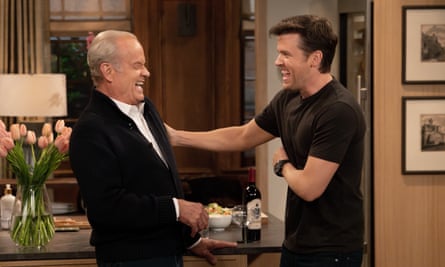
Although none of the key characters in the original were gay, many of the cast, writers and creatives were, and this influence was considerable. The same effect has yet to be detected in the spin-off, though Cristalli protests that “our staff has queer people on it. You can’t have 12 white straight guys writing a show. It’s just not gonna be very good.”
The most robust lines in the new show come from the mouth of – and this still seems weird to write – Nicholas Lyndhurst. He plays, with immaculate indolence, Prof Alan Cornwall, a friend of Frasier’s from Oxford now loafing about the psychiatric faculty. The casting is less of a curveball the closer you look. There’s much shared DNA between Frasier and Only Fools and Horses (two brothers and an old man stuck with one another). “They are remarkably similar,” says Grammer. “That did not go unnoticed by me, in terms of thinking Nick would be perfect.”
Original Frasier may have taken Niles, or a remarkable succession of lingerie models, to the opera but he never had an actual pal. Grammer, meanwhile, met Lyndhurst in 2019 when they co-starred in Man of La Mancha in London. “We basically fell in love,” says Grammer. “And my wife fell in love with his wife. It was a love-fest from the get-go. He’s a marvellous man, and it’s been a tough couple of years for him.”
The role is Lyndhurst’s first since the sudden death of his 19-year-old son, Archie, from a brain haemorrhage in 2020. One suspects Grammer would be a friend of considerable kindness. Today, he cheerleads hard for Lyndhurst. American audiences, he says, “are like: who is that guy? He is remarkably funny. I always say to all the other actors: watch your back, because he will steal every scene he can.”
Earlier this year, I witnessed this firsthand. The Paramount lot in Los Angeles is manicured and magnificent but still an industrial estate: 30 airless warehouses generating millions of dollars. Watching the season finale being filmed was like wandering into a Dunelm to find them putting on Noël Coward.
The main thing that strikes you, sitting on bleachers in front of the three key sets, is the theatricality. “It’s like rehearsing a 30-minute play over four days,” says Cutmore-Scott. “Then one night you shoot it in front of 200 people, straight through, in chronological order. That’s incredibly intense. It’s very, very stressful. I’m very aware of the adrenaline that was coursing through my body in that first episode.”
Ten episodes later, the cast appeared calmer. Lyndhurst barely broke sweat, casually lobbing ad libs in the bloopers. Each scene is generally shot three or four times, with lines tweaked in light of the laughs, or lack of them. The whole thing took four hours. (Tapings of Friends often ran to 12, so the producers could extract maximum audience reaction.) Sometimes this is too strong: when two characters kissed, Grammer – who was also directing – instructed the crowd to “kill the woos”. The wildest screams met the Roz reveal: the first sight of Gilpin’s character, who makes a guest appearance.
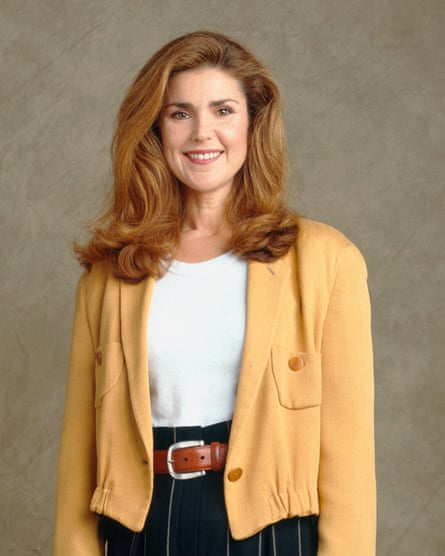
“It was surreal,” says Gilpin. “Like living out a dream. I had missed it so much. Frasier is like my brother or my bestie; I care deeply about him and feel the same about Kelsey. I was honoured they welcomed me back.” The return reminded her why multi-camera shows generate so much warmth: the connection between cast and studio audience somehow travels “through the TV into the people at home”.
Cutmore-Scott agrees. “Single-camera comedies, where you’re acting in a vacuum, can’t achieve that sense of community. In this show, the audience is a character. We are completely beholden to their feedback.” He grew up watching Friends – he’s British and credits his accent to Chandler – but it wasn’t until he made Frasier he clocked how he’d been hooked. “Multi-camera comedy allows you to get as close as possible to the feeling you are in a room with these characters. At the cafe, sitting around the table together, laughing.” Spectators in the studio are well catered for, with an emcee between takes and lots of chocolate. Shooting the original, says Gilpin, “we were really careful not to take too long for costume changes. We didn’t want to lose the audience’s interest.” If any of the cast felt they were about to stumble over dialogue, they were instructed to “just stop. Mess it up before you get to the punchline. Let the audience hear it fresh.”
It was hard not to be charmed. Grammer wept during the welcomes. Some of his children were in the crowd. Gilpin brought along her husband and what I assumed were their daughters but were actually her first two followers on Twitter. “Jordan and Caitlyn. They’re adorable. I was so thrilled they came across the country for that.” Mahoney’s bar even serves real beer: the IPA of Grammer’s own brand, Faith American: “There’s nothing stunt on our show,” he says. Gilpin didn’t realise until the cameras rolled. “It was delicious,” she reports, “but it had a major, major kick. And I’m familiar with drinking.”
In case it’s not yet obvious, the whole production – right down to the booze – is Grammer’s baby. That final day of the shoot was also the first day of the writers’ strike, so as well as starring and directing, he was shouldering full showrunner duties (Cristelli and Harris repaired to a bar nearby). To watch him conduct the whole operation was extraordinary. “It’s where I was supposed to go,” says Grammer. “It’s a natural endpoint of 30 years of preparation. I wanna involve everybody but, in the end, I cast a long shadow. And it’s OK, because I’m a fair man and I’ve really worked hard to get where I’m at.”
Grammer is unapologetic about success, both his own and that of his character – now so wealthy he can buy an apartment block without blinking. “I busted my ass and Frasier busted his ass. We have worked really hard to get where we are. I think the only lesson that comes from success that’s also accompanied by great monetary reward is that you worked really hard. I don’t think that’s gonna be much of an issue for a lot of people, except those who don’t want to [work hard].”
He invokes Jeff Bezos. “You can say, well, yeah, he’s absolutely a little bit … but I mean, look what he did! I go into stores and people say, ‘Well, honestly, why don’t you just get it from Amazon? It’s gonna take us three weeks.’ That’s something remarkable. Maybe it’s eaten up a few other going concerns. And I do believe small business is a great throbbing heartbeat of capitalism, because you get to claim your ground and state your case and deliver goods. But if you don’t, you don’t survive.”
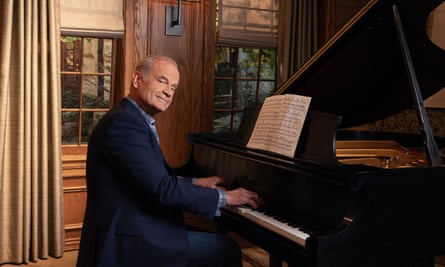
Assumption of entitlement is a dangerous thing, he continues. Some of his ancestors “walked across the country and lost children and died in the middle of the American plains. This doesn’t feel like privilege, it feels like sacrifice. And so their sacrifice maybe passes on and you carry some of that, and maybe that’s a generational inheritance.”
Yet inequality is in sharper focus today than it was in 1993. Indulgence of Frasier and Niles’s excesses was tempered by their being the butt of the joke. “Martin would always best them,” says Harris. “It wasn’t punching down.” The new show punches up freely because Frasier’s cushioning means the fall hurts less. “He’s gonna bounce back because he’s in a decent position.”
Cristalli nods. He’s just watched Shrinking, with Jason Segel as a psychiatrist who has lost his wife. “If he had a dinner party, you’d want it to go really well because he’s emotionally raw. But with Frasier, his dad has just died and you’re like: ‘Oh man, I can’t wait to see how bad this dinner party goes. I want the wheels to come off in spectacular fashion.’”
There is something illogical about loving Frasier, they agree. “The character oughtn’t to be that likable,” says Cristalli. “The richest guy in the room shouldn’t be the one you’re rooting for. But Kelsey has this twinkle in his eye.” Cristalli shakes his head. For all that he knows the man, a kernel of perversity remains. “I don’t know what he does. But he is just so good at it.”
Frasier is on Paramount+ now.
